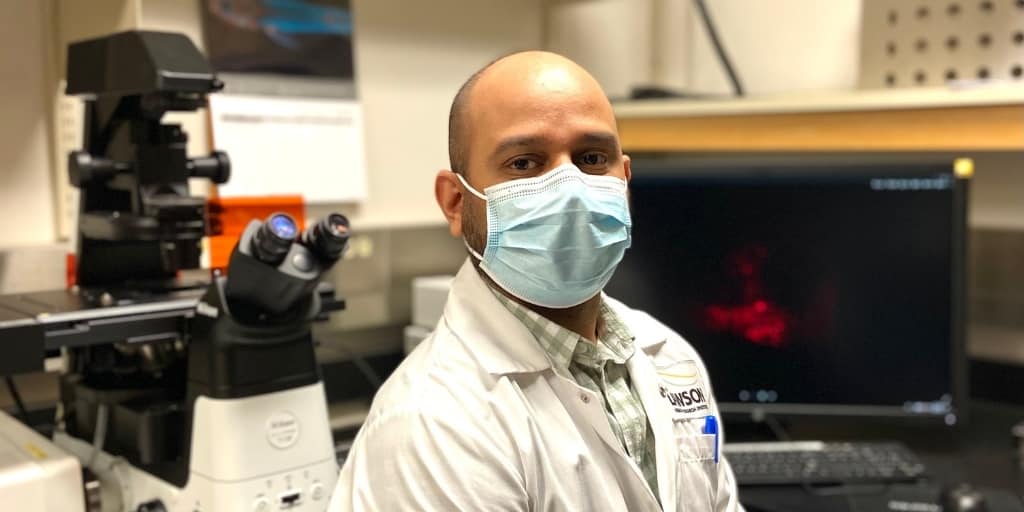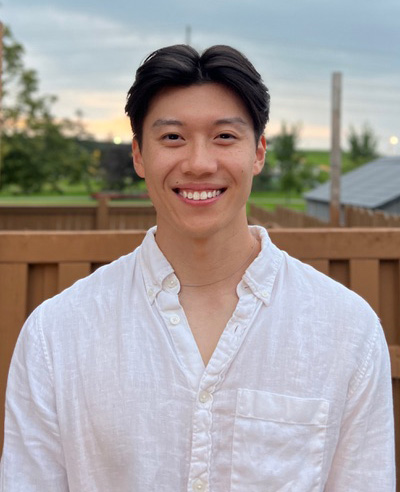Welcome back to the TBCRU. Can you remind our readers who you are and tell us a little bit about yourself?
My name is Dr. Vasudeva (Vasu) Bhat, and I am a postdoctoral research associate in the Department of Anatomy and Cell Biology at Western University. I am co-supervised by Dr. Alison Allan and Dr. David Palma. I received my Ph.D. from the University of Manitoba.
As a senior researcher, why is the TBCRU Studentship Award important to you and how does it allow you to advance your research?
This award is very important to me as a trainee and I am both honoured and grateful to receive this award. It gives me a sense of responsibility as well as provides recognition for the work we do. As a trainee, it takes the pressure away from the finances and allows me to focus on my research. Breast cancer is an important healthcare concern worldwide, and supporting researchers and trainees such as myself provides much-needed support in these challenging times. I want to thank the Breast Cancer Society of Canada for this initiative and their continued steadfast support.
In a few lines, please remind us what you are doing and what problems do you hope to solve with your research?
In some breast cancer patients, cancer can spread (metastasize) to distant organs such as the bone, liver, lung or brain. When this spread is extensive, it can be deadly. However, in certain patients, the spread may result in only a few new metastatic tumours. This is known as the “oligometastatic” state. It is believed that oligometastatic patients can be successfully treated and even potentially cured. My work investigates whether a patient’s blood contains accurate indicators of this oligometastasis, and whether these blood indicators could help determine if breast cancer patients are good candidates for curative treatment. The indicators in the blood that we are looking at are circulating tumour cells, circulating DNA, and host immune cells. We assess these indicators and compare them to breast cancer patient survival rates and disease progression after specialized radiation therapy in a phase III clinical trial.
Since we last spoke, have there been any changes to or any advancements in your research?
Yes, actually, quite a few! We have been able to recruit a total of 60 patients (control group + treatment group) with 4-10 oligometastatic lesions to the SABR-COMET 10 Phase 3 clinical trial (5 cancer centers in Canada are involved in this study). I have also contributed to a study protocol for a randomized phase III trial published in BMC Cancer (available here). Additionally, I am working on a second breast cancer project focused on understanding the role of the lung microenvironment in influencing breast cancer stem cell activity and metastasis.
Have you had an opportunity to present your research to your peer researchers?
Last year I presented my research work at a virtual conference, the 2020 Mechanisms & Models of Cancer, organized by Cold Spring Harbor Laboratory, USA. I also intend to submit an abstract to present my work at the International Society of Liquid Biopsy Annual meeting (October 2021).
Did that presentation setting help you share your breast cancer research with the broader scientific community?
Yes, it did! The international meeting was the most appropriate platform to share my work with the experts within the field and researchers from other disciplines. It is helpful to have an inter-disciplinary perspective on my research areas as it brings out some new questions and constructive discussion. I was quite happy and satisfied with the attention my research work garnered during the meeting.
Did the feedback that came about from presenting your research help you and your research in any way?
Discussing my research with a broader audience helped in looking at my project from a different perspective. This helped me identify limitations and further improve the quality of my research.
Now that you have had some more time with your research, how do you think it will be applied in a real-world situation?
Identification of a treatable group of oligometastatic patients is very crucial. So far, the evidence suggests that certain indicators in blood could be used to identify and define these patients specifically. In the future, I believe a simple blood test panel could be used to determine the oligometastatic state and eventually treat it.
Tell us about your involvement in the Breast Cancer Society of Canada fundraising events (Dress for the Cause, Mother’s Day Walk)?
I participated in the Mother’s Day walk/One Billion Steps Challenge (May 2020). I was able to able to raise over $1,000 to support breast cancer research. I was also involved in the virtual Dress for the Cause events organized during breast cancer awareness month (October 2020). In addition, I was a member of the silent auction organizing committee. I am a photographer by hobby, and I donated three of my photographs which raised over $200 to the cause. I am also participating in the 2021 Mother’s Day Walk/One Billion Steps Challenge to encourage more donors to support breast cancer research.
What about your participation in other Breast Cancer Society of Canada donor events or tours. How has that impacted your perspective on breast cancer research?
I was fortunate to meet the core BCSC team members before the pandemic, and I was happy to learn there is constant support from the donors towards breast cancer research. They told me about the stories and reasons behind the donations. This further motivated me to commit more strongly to the fight against breast cancer.
What are you currently reading, watching or listening to outside of the lab?
At present, I am reading ‘419’ by Will Ferguson (suggested by Dr. Allan). I am a big fan of Star Wars and an MCU fan. I finished watching WandaVision Session 1 and am currently watching The Falcon and The Winter Soldier.
Support researchers like Vasudeva Bhat by donating to the Breast Cancer Society of Canada. Visit bcsc.ca/donate today.




